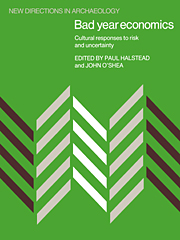Book contents
- Frontmatter
- Contents
- List of contributors
- List of figures
- List of tables
- Preface
- 1 Introduction: cultural responses to risk and uncertainty
- 2 The spirit of survival: cultural responses to resource variability in North Alaska
- 3 Saving it for later: storage by prehistoric hunter–gatherers in Europe
- 4 The role of wild resources in small-scale agricultural systems: tales from the Lakes and the Plains
- 5 The economy has a normal surplus: economic stability and social change among early farming communities of Thessaly, Greece
- 6 Changing responses to drought among the Wodaabe of Niger
- 7 Of grandfathers and grand theories: the hierarchised ordering of responses to hazard in a Greek rural community
- 8 Risk and the polis: the evolution of institutionalised responses to food supply problems in the ancient Greek state
- 9 Monitoring interannual variability: an example from the period of early state development in southwestern Iran
- 10 Public intervention in the food supply in pre-industrial Europe
- 11 Conclusion: bad year economics
- References
- Index
- ALSO IN THIS SERIES
10 - Public intervention in the food supply in pre-industrial Europe
Published online by Cambridge University Press: 26 October 2009
- Frontmatter
- Contents
- List of contributors
- List of figures
- List of tables
- Preface
- 1 Introduction: cultural responses to risk and uncertainty
- 2 The spirit of survival: cultural responses to resource variability in North Alaska
- 3 Saving it for later: storage by prehistoric hunter–gatherers in Europe
- 4 The role of wild resources in small-scale agricultural systems: tales from the Lakes and the Plains
- 5 The economy has a normal surplus: economic stability and social change among early farming communities of Thessaly, Greece
- 6 Changing responses to drought among the Wodaabe of Niger
- 7 Of grandfathers and grand theories: the hierarchised ordering of responses to hazard in a Greek rural community
- 8 Risk and the polis: the evolution of institutionalised responses to food supply problems in the ancient Greek state
- 9 Monitoring interannual variability: an example from the period of early state development in southwestern Iran
- 10 Public intervention in the food supply in pre-industrial Europe
- 11 Conclusion: bad year economics
- References
- Index
- ALSO IN THIS SERIES
Summary
The history of pre-industrial Europe shows that public authorities have almost invariably interfered with the urban food supply. In this paper, it is argued that there were sound reasons for such intervention. Fluctuations in supply would – in a free market – inevitably have led to enormous fluctuations in the price of the staple food. The mass of the urban population would not have been able to cope with these price fluctuations and would have demanded effective measures on the part of the authorities.
Theoretically a number of different types of measures can be predicted, and they can all be documented from the historical record. Specific historical circumstances, however, determine which coping strategy will be prevalent. A comparative analysis of Classical antiquity (in particular Imperial Rome) and the cities of late medieval and early modern Europe demonstrates that costs and benefits of particular coping strategies may differ considerably. It also demonstrates that a purely economic analysis is not sufficient. The nature and extent of state power is at least as important, and so are changes in popular expectations.
In the Digression concerning the Corn Trade and Corn Laws in the Wealth of Nations, Adam Smith complains:
The laws concerning corn may every where be compared to the laws concerning religion.[…]
- Type
- Chapter
- Information
- Bad Year EconomicsCultural Responses to Risk and Uncertainty, pp. 114 - 122Publisher: Cambridge University PressPrint publication year: 1989
- 11
- Cited by

